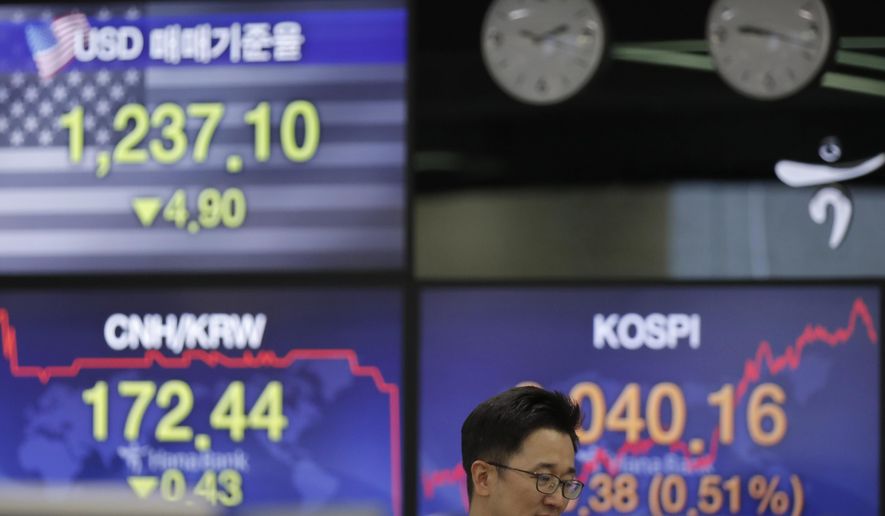
Global stocks mixed on unease over Hong Kong security law
by JOE McDONALDGlobal stock markets were mixed Wednesday as U.S.-Chinese tensions over Hong Kong vied with optimism about recovering from the coronavirus pandemic.
Benchmarks in Shanghai and Hong Kong retreated after the White House said a proposed national security law might jeopardize the Chinese territory’s status as a global financial center.
“Mounting U.S.-China tensions bodes ominously for the global economy amid pandemic fragilities,” Mizuho Bank said in a report.
London and Frankfurt opened higher, while Tokyo also advanced.
The FTSE 100 in London rose 0.9% to 6,123.50 and Frankfurt’s DAX added 1% to 11,617.13. The CAC 40 in France gained 1.1% to 4,656.90.
On Wall Street, the future for the benchmark S&P; 500 Index was 0.9% higher and that for Dow Jones Industrial Average climbed 1%.
On Tuesday, Wall Street closed at its highest level in nearly three months on hopes the global economy might be recovering from its deepest slump since the 1930s as more countries reopen factories, shops and other businesses.
In Asia, Hong Kong’s Hang Seng lost 0.4% to 23,301.36 after falling as much as 0.7% earlier in the day. The Shanghai Composite Index declined 0.3% to 2,836.80.
The law under consideration for Hong Kong by the Chinese legislature has prompted warnings it might erode the independence of courts and other elements that help to make the former British colony a business center.
The legislation would alter Hong Kong’s Basic Law, or mini-constitution, to allow Beijing to compel its government to enact laws. That would circumvent a local legislature that withdrew a proposed security law in 2003 following public protests.
Hong Kong’s leader tried Tuesday to reassure businesses and the public the law wouldn’t threaten civil liberties. Details haven’t been released, but the decision to enact the law reflects the determination of President Xi Jinping’s government to tighten control over Hong Kong following anti-government protests.
President Donald Trump said he was working on a response but declined to give details.
Trump is “displeased with China’s efforts and that it’s hard to see how Hong Kong can remain a financial hub if China takes over,” said White House press secretary Kayleigh McEnany. She declined to elaborate.
Friction has already mounted over the pandemic, which originated in China, and over whether Beijing is delivering on pledges to boost imports from the U.S. as part of a trade deal with Washington.
Elsewhere in Asia, the Nikkei 225 in Tokyo recovered from early losses to gain 0.7%, closing at 21,419.23. The Kospi in Seoul edged less than 0.1% higher to 2,031.20 and Australia’s S&P-ASX; 200 was off less than 0.1% at 5,775.00.
India’s Sensex rose 2.8% to 31,455.60 and New Zealand gained 1.2%. Singapore declined while Bangkok and Jakarta advanced.
On Wall Street, the S&P; 500 rose 1.2% on Tuesday. It is 12% below its all-time high in February.
The Dow Jones Industrial Average climbed 2.2% and the Nasdaq composite rose 0.2%.
Financial and industrial stocks accounted for much of the market’s gains. Companies that rely on consumer spending also rose broadly. Airlines were big winners as traders welcomed data showing a pickup in air travel during the long holiday weekend.
Fears of a crushing recession due to the coronavirus sent the S&P; 500 into a skid of more than 30% in March. Hopes for a relatively quick rebound and unprecedented moves by the Federal Reserve and Congress to stem the economic pain drove a historic rebound for stocks in April and have bolstered optimism that the market won’t return to the depths seen two months ago.
Fresh optimism about the development of potential vaccines for COVID-19 has also helped lift stocks. Investors are focused on the process of reopening the U.S. economy, which is likely to accelerate over the summer.
In energy markets, benchmark U.S. crude lost 40 cents to $33.95 per barrel in electronic trading on the New York Mercantile Exchange. The contract rose $1.10 on Tuesday to settle at $34.35. Brent crude, used to price international oils, declined 54 cents to $36.20 per barrel in London. It rose 64 cents the previous session to $36.17.
The dollar gained to 107.58 yen from Tuesday’s 107.54. The euro retreated to $1.0966 from $1.0993.